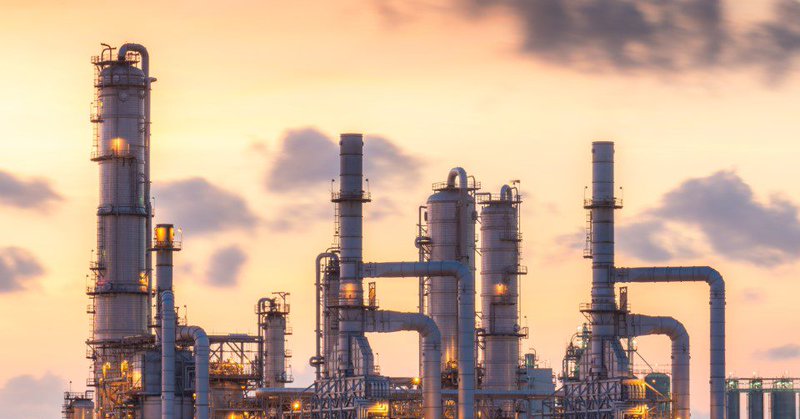
Planet Tracker
@planet_tracker
Followers
6K
Following
3K
Media
4K
Statuses
6K
Planet Tracker is a non-profit financial think tank aligning financial markets with a sustainable future #Sustainability #PlanetTracker #capitalmarket
London, UK
Joined April 2019
The chemical industry is a key player in the transition to a net-zero economy. Our latest report benchmarks the climate transition performance of eight of the world’s top chemical companies. Learn about the sector-specific challenges they face: https://t.co/3FgGQw57oo
0
0
3
OAN delivers real, fact-based news with breaking coverage around the clock, featuring direct reports from the President, top administration officials, and congressional leaders. Watch One America News on YouTube TV Today.
64
72
259
Images below: global annual mean sea surface temperature anomalies relative to the 1961–1990 average in degrees C; how climate change affects the seafood industry; economic and financial risk; and an array of methods to both adapt to and mitigate the effects of climate change.
1
0
0
Planet Tracker urges companies across the seafood value chain to step up their climate adaptation investments, build capacity, and collaborate with science and policy.
1
0
0
The physical, economic and financial manifestations of these risks cascade down value chains and affect economies, livelihoods, social structures, food security and geopolitics.
1
0
0
Green markets exploding. Santa myths unraveling. A holiday special where commerce, culture, and psychology collide. Dr. Stefanie Stolinsky & Dr. Anthony Silard join: SHAKE IT OFF WITH MERT & LUCAS, LIVE! Sunday, Dec. 21, 2025 | 7–9 PM EST | AM970 Radio | Streaming everywhere.
1
13
58
Climate change is stressing the seafood industry's natural assets, putting financial investments in the seafood economy at risk. It adds and amplifies a complex, interlinked web of physical, economic, financial and systemic risks.
2
0
0
These range from water pollution and eutrophication to biodiversity impacts, greenhouse gas emissions and toxic impacts on human health. These risks are drawing increasing regulatory scrutiny, reputational risk and consumer pressure.
1
0
0
Fertiliser and crop protection companies are central to global food production. However, there is growing recognition that their businesses are exposed to a range of sustainability related risks.
1
0
1
$MU posted great earnings, giving some relief to the AI trade skepticism. What's next for Micron, is it still a buy?
1
5
7
COP30 puts agri-food squarely in the spotlight. It’s time for companies to publish methane data, set explicit targets and finance solutions that reduce emissions. Read the new Planet Tracker report and see where pressure is most needed.
0
0
0
Engaging with high methane emitters is urgently needed. By raising the bar on disclosure, target setting and abatement planning, investors can protect long-term value by reducing climate, transition, reputational and regulatory risks in global food and agriculture supply chains.
1
0
0
Collectively, these firms emit around 22 million tonnes of methane a year – making them the world’s 5th-largest emitter in CO₂e equivalent terms. Proven measures exist, from feed and manure interventions to rice field alternate wetting and drying, which can cut emissions 37–77%.
1
0
0
The Global Methane Pledge is unachievable without a step change in action from the agri-food sector. Out of 52 of the largest meat, dairy and rice companies we assessed, only seven disclose their methane emissions. Just one – Danone – has a specific methane reduction target.
1
0
0
Bayer is projected to align with a 2°C warming scenario by 2030. Key downstream categories, such as product use, remain excluded from Scope 3 disclosures, resulting in a likely underestimation of Bayer’s climate footprint. Learn more:
0
0
0
There is a structural tension in the petrochemical value chain - energy suppliers are seek to sell more fossil inputs to an industry aiming to phase them out, as part of their transition to net zero.
carbontracker.org
Introduction Many credible commentators, such as the International Energy Agency (IEA), BloombergNEF, DNV, McKinsey, and bp,...
0
0
0
As President Lyndon B. Johnson said at our University's dedication in 1964: "Time is the most valuable thing you have-be sure you spend it well!" Spend it building. Spend it learning. Spend it helping others find their opportunity. And most importantly, spend it making a
0
21
80
We’re proud to be partnering with the Climate Innovation Forum on 25th June. Message us to apply for one of our limited complimentary passes or receive our 25% Institutional Partner discount
0
0
0
We’re proud to be partnering with the Climate Innovation Forum on 25th June. Message us to apply for one of our limited complimentary passes or receive our 25% Institutional Partner discount
0
0
0
We’re proud to be partnering with the Climate Innovation Forum on 25th June. Message us to apply for one of our limited complimentary passes or receive our 25% Institutional Partner discount
0
0
0
⚠️Corporate liabilities linked to plastic litigation could exceed USD 20 billion by 2030. Companies across the plastic value chain face growing legal risks from pollution, toxic chemicals, greenwashing, and non-compliance with waste laws. Learn more:
0
0
0
Synthetic fertiliser use in Brazil emits a total of 79 Mt CO2e – 83 Mt CO2e each year, equivalent to 7% of national emissions in 2021. However, fertiliser-related GHG emissions could be reduced by up to 86%. Learn how: https://t.co/o30d0aLVbx
0
1
0
ICYMI: We’re sharing the blueprints we used at Box for enterprise AI transformation in our new Executing As An AI-First series. 6 takeaways from this week’s installment: Start permissive. Consolidate ruthlessly. Transform workflows. Make it continuous.
2
5
13






